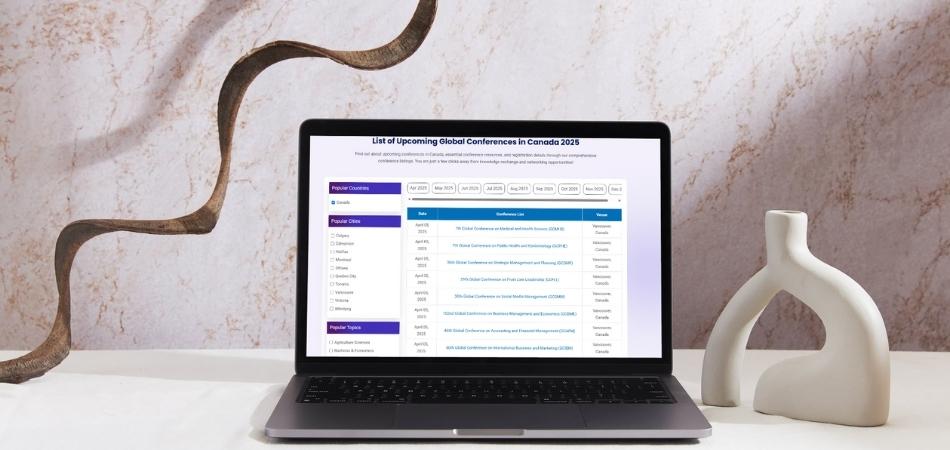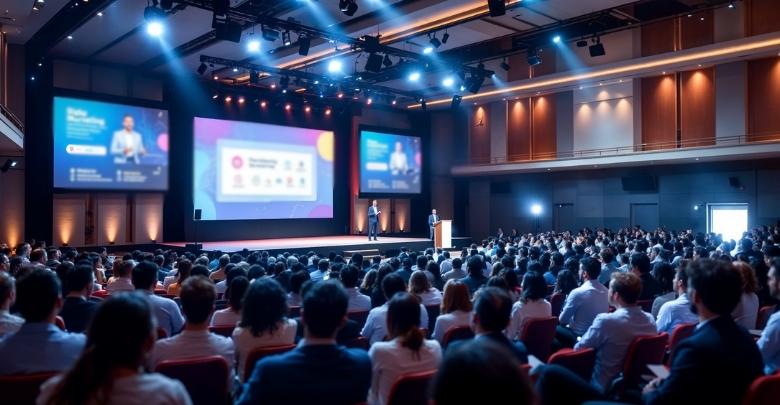There is no doubt that academic conferences in the USA are important platforms for researchers, scholars, and professionals to present their work, obtain insights from experts, and network with like-minded individuals. When participants attend the right conference, they can expand their network, find funding, and advance their career. But how to find relevant academic conferences in USA?
To find the best academic conferences, start by exploring academic databases and conference listing websites like Global Conference Alliance Inc. and Eventbrite. Aside from that, professional associations often provide curated lists of upcoming events. Platforms like Google Scholar, ResearchGate, and field-specific websites can also help identify relevant conferences.
It is also beneficial to network with peers, professors, and industry experts to discover opportunities that match your research interests. To ensure you choose conferences that will benefit your academic and professional growth, read the following tips and strategies.
How to Find Relevant Academic Conferences in USA? Tips & Resources
Academic conferences provide a platform to present research, connect with experts, and stay updated on the latest advancements. Finding the right event can open doors to networking and career growth. This guide outlines effective strategies to help you discover relevant academic conferences in the USA.
Step 1: Explore Academic Databases for Verified Listings
Academic databases are a great starting point for finding upcoming conferences in your field. They provide well-organized listings with event details, ensuring credibility and relevance. Searching by topic, location, or date can help narrow down options. These databases are commonly used by researchers to track the most relevant academic events.
Step 2: Browse Conference Listing Websites for Updated Events
Online platforms like Global Conference Alliance Inc. and Eventbrite offer extensive directories of academic conferences across various disciplines. These sites categorize events by subject, making it easier to find ones that match your interests. Whether you’re searching for a specific conference in USA or exploring general academic gatherings, these platforms provide valuable insights. Users can also subscribe to updates and notifications so they never miss important information.
Step 3: Utilize Search Engines to Identify Upcoming Conferences
Search engines can help track academic conferences by using specific keywords related to your field. Searching phrases like “upcoming research conferences in the USA” can generate useful results. Many conferences have dedicated web pages with details on registration, speakers, and schedules. This method helps you explore various options beyond traditional academic sources.
Step 4: Check Professional Associations for Exclusive Listings
Academic and industry associations often host or endorse conferences related to their fields. These organizations provide well-curated lists of upcoming events that align with research and professional growth. Becoming a member can offer early access to event details and networking opportunities. Professional groups ensure that the conferences they promote meet high academic standards.
Step 5: Utilize Academic Networks for Insider Information
Online academic communities frequently discuss upcoming conferences and share event recommendations. Engaging in these discussions helps you discover new opportunities that might not appear in general listings. Scholars and researchers often share insights about conferences they plan to attend. Staying active in such communities can lead to valuable connections and invitations.
Step 6: Use Specialized Websites for Discipline-Specific Conferences
Many fields have dedicated websites listing specialized conferences and research events. These platforms focus on niche topics, ensuring that attendees find highly relevant events. Checking these sources regularly can help researchers stay informed about smaller, topic-focused conferences. This approach is especially useful for those looking for highly specialized academic discussions.
Step 7: Network with Peers and Professors for Insider Insights
Personal recommendations from colleagues, mentors, and professors can be invaluable in finding academic conferences. Experienced researchers often suggest events based on quality, reputation, and networking potential. Attending smaller gatherings can lead to invitations for larger conferences. Actively participating in academic discussions increases the likelihood of discovering meaningful opportunities.
What Red Flags Indicate a Low-Quality or Fake Conference?
Identifying low-quality or fake conferences is essential to avoid wasting time and money. Recognizing key warning signs can help. Here are some red flags to watch for when evaluating an academic event.
- Lack of Clear Organizing Body: A legitimate conference is backed by a recognized organization or institution. If the organizers are unknown or have no credibility, be cautious.
- Unrealistic Promises and Exaggerated Claims: Fake conferences often guarantee publication in top journals without rigorous review. Such promises indicate a lack of academic integrity and credibility.
- Minimal or No Peer-Review Process: Reputable conferences follow strict peer-review procedures before accepting submissions. A conference that accepts all papers without review is suspicious.
- Unverified or Unknown Keynote Speakers: Legitimate events feature well-known experts and researchers as speakers. If the listed speakers have no verified academic background, it’s a red flag.
- Unprofessional or Poorly Designed Website: A trustworthy conference maintains a professional website with verifiable information. If the site has errors, missing details, or vague descriptions, be wary.
- High Registration Fees with No Justification: Fake conferences often charge high fees without explaining where the money goes. Transparency regarding registration costs is essential for credibility.
- Frequent Venue Changes or Unclear Location Details: A legitimate conference announces its venue early with confirmed details. If locations change frequently or remain vague, then reconsider attending.
- Aggressive Email Invitations and Spam Tactics: Scam conferences often send mass invitations to unrelated researchers. Receiving unsolicited emails urging immediate registration is a warning sign.
How to Choose Between Virtual, Hybrid, and In-Person Academic Conferences?
In academic conferences, the format virtual, hybrid, or in-person is influenced by a number of factors, such as convenience, cost, networking, and engagement. Each format has its pros and cons, so it’s essential to evaluate them based on your needs. Below is a comparison of these three conference formats across different factors.
| Factor | Virtual Conference | Hybrid Conference | In-Person Conference |
| Convenience | High, attend from anywhere | Moderate, some travel needed | Low, requires travel to the venue |
| Cost | Lower, no travel expenses | Moderate, some travel costs | Higher, travel, accommodation, and registration |
| Networking Opportunities | Limited, no face-to-face interaction | Balanced, combines both options | High, face-to-face with peers and experts |
| Accessibility | Accessible globally | Accessible globally and locally | Limited to the event location |
| Event Size | Smaller scale | Medium scale | Large scale, often with multiple sessions |
| Interaction Level | Minimal chat and Q&A | Moderate, both online and in-person interaction | High, direct discussions and participation |
| Global Reach | High, accessible worldwide | High, accessible worldwide and in-person | Limited to attendees who can travel |
| Environmental Impact | Low, no travel required | Moderate, reduced travel for some | High, travel contributes to a larger carbon footprint |
| Technology Requirements | High, requires reliable internet and platform | Moderate, requires both virtual and physical setup | Low, requires minimal technology |
| Learning Experience | Focused, can attend specific sessions | Flexible, can choose between virtual and in-person sessions | Immersive, hands-on learning and experience |
| Flexibility | High, can attend from anywhere and on demand | Moderate, some sessions are in-person | Low, bound to the event schedule and location |
| Personal Engagement | Limited, no personal interaction | Moderate, both virtual and face-to-face | High, personal interaction and networking |
Is It Easy to Get Sponsorship for Participation in USA Conferences?
No, getting sponsorship for participation in USA conferences is not always easy. Many organizations and institutions provide funding, but competition is tough. Applicants must prepare strong proposals that highlight research value, impact, and relevance to the conference.
Finding financial support takes effort, but sponsorship opportunities for US conferences are available through companies, universities, and professional organizations. Sponsors often look for applicants who can provide mutual benefits, such as promoting their brand or contributing valuable research. Securing funding requires demonstrating how attending the conference aligns with the sponsor’s goals.
Applying early, exploring multiple sources, and networking can improve success rates. Strong recommendations and well-prepared applications make a significant difference. While challenging, persistence and strategic planning help researchers and professionals secure sponsorship for attending academic events in the USA.
What Are the Next Steps After Attending an Academic Conference in the USA?
Attending an academic conference is a valuable experience, but what you do afterward matters just as much. Following up properly can help expand connections, apply new knowledge, and create future opportunities. Here are essential steps to take after participating in a conference in the USA.
Organize and Review Your Notes
Sorting through notes helps reinforce key insights and ideas learned during the conference. Reviewing important discussions allows you to apply new knowledge effectively. Summarizing the main takeaways makes it easier to reference in future research or projects. Well-organized notes help in writing articles, reports, or academic papers based on conference sessions.
Follow Up with New Contacts
Networking is valuable, but building strong relationships requires follow-up. Sending emails or messages shows appreciation for meaningful conversations. A simple thank-you note can leave a positive impression. Staying connected helps open doors to collaborations and future opportunities.
Apply Conference Learnings to Your Work
Implementing new insights helps improve academic research and professional projects. Applying key takeaways to ongoing studies enhances their impact and depth. Sharing knowledge with peers strengthens the learning process. Practical application makes attending conferences more beneficial in the long run.
Explore Further Research and Collaboration
Conferences introduce new perspectives that can inspire future research ideas. Connecting with experts provides opportunities for joint studies and co-authored papers. Collaborative efforts often lead to better funding and academic recognition. Research partnerships strengthen professional growth and increase publication chances.
Consider Future Academic and Professional Steps
Attending conferences often sparks ideas for future goals and career moves. Exploring post-conference visa and immigration options can help in planning academic or professional stays. Opportunities for further study, research fellowships, or job prospects should be considered. Thinking ahead ensures long-term career growth.
Share Your Experience with Others
Writing about the conference helps spread knowledge to colleagues and students. Social media posts or blog articles can highlight key insights. Giving a presentation at your institution benefits peers. Sharing experiences reinforces learning while helping others stay informed.
Frequently Asked Questions
When there are so many academic conferences in the USA, finding the right one can be challenging. Researchers, scholars, and professionals must know how to identify credible conferences that align with their field of study. The following are frequently asked questions with detailed answers to assist you in the process.
What Are the Key Factors to Consider Before Registering for a Conference?
Consider the conference’s relevance to your research, location, cost, speaker lineup, and peer review process. Look into the networking opportunities and publication possibilities associated with the event. Ensure that it aligns with your academic or professional goals.
Can I Present My Research at a Conference Without Being a Ph.D. Holder?
Yes, many academic conferences accept submissions from graduate students, independent researchers, and professionals. The key is submitting a well-prepared abstract that aligns with the conference theme. Some events have specific tracks for early-career researchers.
How Early Should I Start Searching for Conferences?
Begin searching for conferences at least six to twelve months in advance to allow time for submission and travel arrangements. Some prestigious conferences have deadlines for abstracts or full papers months before the event. Early planning also increases the chances of securing funding.
What Are the Different Types of Academic Conferences?
Academic conferences can be discipline-specific, interdisciplinary, industry-focused, or specialized in niche research areas. Some events focus on paper presentations, while others emphasize workshops, keynote speeches, and networking. Understanding the format helps choose the right conference.
How Can I Increase My Chances of Getting Accepted as a Speaker?
Submit a well-researched abstract that aligns with the conference’s theme and guidelines. Highlight the significance of your research and its impact on the field. Strong references, previous publications, and networking with conference organizers can also help.
What Should I Do If I Miss the Abstract Submission Deadline?
If you miss a deadline, contact the organizers to check if late submissions are accepted. Some conferences allow waitlist applications or last-minute slots. Otherwise, consider submitting to the next edition of the same conference.
Bottom Line
Research and strategy are essential to finding the right academic conference in the USA. To begin, explore academic databases, professional organizations, and conference listing websites. Furthermore, networking with peers and professors can help uncover hidden opportunities. When unsure how to find relevant academic conferences in USA?, consider using specialized platforms and engaging with academic communities.
Whether searching through search engines or utilizing field-specific websites, staying proactive is key. Following these tips can help you attend conferences that align with your academic and career goals, empowering you to grow and learn.








